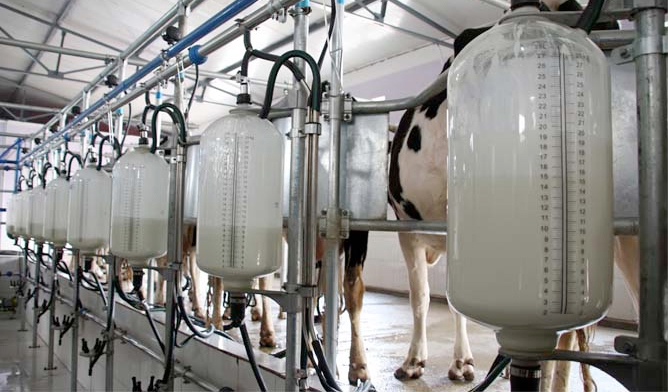
It's up to the milk processors to set the price paid to farmers, we are not profiting from the milk price cuts, Morrisons' Agricultural Manager Andrew Loftus said as he addressed the Holyrood inquiry into the crisis.
"So on the question of us profiteering or making more – the trend is downwards, we’re making less than we were," he said.
Rob Gibson MSP, Convener of the Committee said: "The Committee is urgently seeking to address the plight of our dairy farmers. It is crucial that we work to find a way to supply milk at a reasonable cost that can sustain the dairy industry in Scotland. In the coming weeks we will be taking evidence from those on the frontline: the dairy farmers themselves.”
But a group of MPs recently urged the government to increase protection to dairy farmers by fining supermarkets for their low prices.
The leader of the Shropshire Council wrote to Sir Jim Paice, head of First Milk, to express concerns about the 'devastating impact' on farmers within the council.
"We have been extremely concerned to learn of the pressure which has now been placed on dairy farmers who are members of First Milk, as a consequence of deferring their payments for supplies of milk and reducing their net payments through capital contributions and price cuts.
"We recognise that these actions are a consequence of extremely volatility on the global dairy market and we will be speaking to stakeholders in the county, such as agricultural suppliers and banks, to encourage an understanding and sympathetic approach to transactions with farmers impacted by market volatility and the actions of First Milk."
Don't blame the supermarkets
The crisis in the dairy industry is not the fault of supermarkets, according to Paice, who was speaking to NFU members in Pembrokeshire.
"It is tempting to blame the supermarkets for the current downturn," he said.
Paice said the fundamental problem with the dairy industry is that there is too much milk on the market.
"We have seen an approximate increase of 10% of milk produced in the UK alone this year.
"That has been exacerbated by two things, China dramatically reduced its purchase of milk powder and then Russia introduced its trade ban, which included dairy products.
"With a third of EU cheese exports going to Russia - that was the final straw and that's why our milk prices are where they are."
Dairy crisis overview
Dairy farmers are under pressure; they are being paid up to 50% less for their milk than 12 months ago.
Why? There is no single reason; price pressure is down to a mix of complex market issues impacting on every link in the dairy chain.
1, Global milk production is up, for example New Zealand production increased by more than 15% on the year, and European by over 5%. Farmers in the main dairy producing countries have been incentivised to produce more milk for a number of reasons – from meeting China’s growing demand, to preparing for an end to European milk quotas in March 2015, whilst in the UK farmers enjoyed an exceptionally good growing season. Added together and supply has grossly outstripped demand.
2, Global commodity prices - increased production has put price pressure on dairy commodities. By the end of 2014, the sector’s barometer, the Global Dairy Trade auction fell by almost 50%, from an all-time high in February 2014 to the lowest in five years.
3, UK commodity prices reflect global ones and since home production has also risen by 10% on the year, more UK cheese, cream and butter has been produced.
4, The Russian ban - the EU exported 23% of its dairy products worth £1.8bn, until trading was forced to cease in August.
5, UK farmgate price - the above trends have impacted on the price paid to dairy farmers which has been on a downward spiral our dairy farmers for the last 14 months. There is no apparent let up in the trend for the first nine months of this year.
